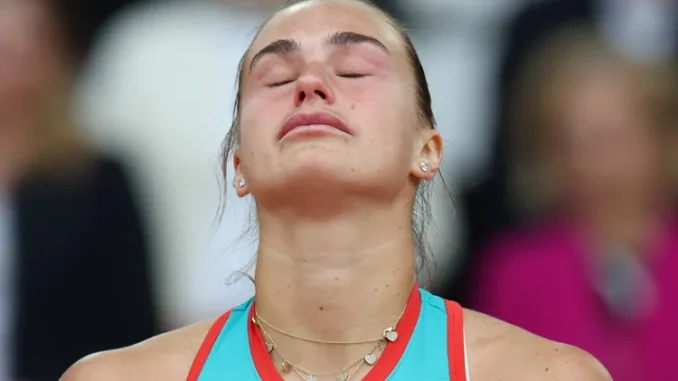
Aryna Sabalenka, the Belarusian tennis powerhouse, has faced a challenging 2025 season despite a formidable 47-9 win-loss record. The world No. 1 in the WTA rankings, Sabalenka has been a dominant force on the WTA Tour, clinching three titles in Brisbane, Miami, and Madrid, and reaching two Grand Slam finals. However, her inability to secure a major title this year has led to a significant setback in the Universal Tennis Rating (UTR) rankings, where she has been overtaken by American Coco Gauff. The UTR system, which emphasizes quality of wins, particularly against top-ranked players, has highlighted Sabalenka’s struggles in the biggest moments, underscoring the sentiment: no Grand Slams, no party.
Sabalenka’s 2025 campaign began with promise as she reached her third consecutive Australian Open final, a feat that places her among the elite, having won the title in 2023 and 2024. However, she fell to Madison Keys in a thrilling 6-3, 2-6, 7-5 defeat in Melbourne. At Roland Garros, Sabalenka again reached the final but was outplayed by Gauff, who claimed a 6-7, 6-2, 6-4 victory, a win that proved pivotal in Gauff’s ascent to the top of the UTR rankings. Sabalenka’s most recent Grand Slam outing at Wimbledon ended in a semifinal loss to Amanda Anisimova, 6-4, 4-6, 6-4, marking her third consecutive major without a title. “Sometimes I was just stopping my arms, making mistakes which I shouldn’t be making,” Sabalenka reflected after her Wimbledon defeat, acknowledging her struggles in critical moments. “I think I should have been a little bit braver today and remember that I’m on the top of the ranking, and I can do that.”
The UTR rankings, unlike the WTA’s points-based system, reward players for defeating higher-ranked opponents, making Gauff’s French Open victory over Sabalenka a significant factor in her rise to No. 1. Sabalenka’s 2025 season has been marked by consistency, with 10 semifinal appearances in her last 11 Grand Slams and a 4,751-point lead over Gauff in the WTA rankings. Yet, her four final losses, including two at Grand Slams, have left her vulnerable in the alternative system. “I’m still hungry, for sure,” Sabalenka declared after her US Open triumph in 2024, signaling her relentless drive to reclaim her dominance. Her 18-2 record at the Australian Open since 2023 and her third major title at the 2024 US Open highlight her prowess, but 2025 has been a tale of near misses.
Sabalenka’s aggressive, risk-taking style, defined by a blistering forehand and powerful serve, has made her one of the WTA’s most formidable players. Her 2025 season included nine WTA 1000 titles, with victories in Wuhan (2018, 2019, 2024), Madrid (2021, 2023, 2025), and Cincinnati (2024). Despite these achievements, her inability to convert Grand Slam opportunities has drawn scrutiny. At Wimbledon, where she has reached three semifinals but never a final, she admitted to a “hate relationship” with the tournament, adding with a hopeful laugh, “I really hope that one day I will turn it around and have a love relationship.” Her emotional resilience was evident in her post-Wimbledon press conference, where she avoided the unprofessional outburst that followed her French Open loss, saying, “I just don’t want to face that hate again. We all can lose control over our emotions. It’s absolutely normal.”
Gauff, meanwhile, has capitalized on her opportunities, reaching the fourth round of the Canadian Open with a 4-6, 7-5, 6-2 win over Veronika Kudermetova. Her victory over Sabalenka at Roland Garros, combined with her consistent performances, has solidified her UTR lead. Sabalenka, who has not competed since Wimbledon due to a planned break, is set to return at the Cincinnati Open, aiming to regain momentum before the US Open, where she triumphed in 2024 against Jessica Pegula. Her 92 hours and 24 minutes on court in 2025, the most among WTA players, reflect her relentless work ethic, but her 3-9 record in Grand Slam semifinals and finals deciding sets suggests a mental hurdle she must overcome.
As Sabalenka prepares for the hard-court season, her focus remains on improvement. “I think I have a better understanding of my game, of my weapons and how to manage my emotions,” she said, contrasting her current self with the player of years past. With a 48-39 record against top-10 players and a history of bouncing back—evidenced by her 20-match win streak in 2024 after a shoulder injury—Sabalenka remains a formidable contender. The Cincinnati Open and US Open offer fresh opportunities to reclaim her Grand Slam glory and potentially the UTR top spot, proving that for Sabalenka, the party is far from over.
Leave a Reply